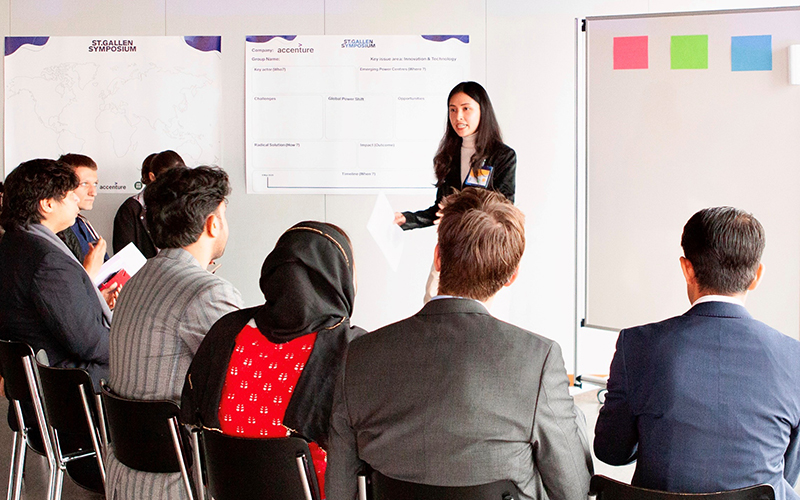In This Story

The Global Essay Competition organized by the St. Gallen Symposium is an annual international competition that invites graduate and postgraduate students from around the world to share their ideas on key economic, political, and social issues. The winners are invited to attend the prestigious St. Gallen Symposium in Switzerland, an interdisciplinary conference that brings together leaders from business, politics, academia, and society.

This year, Schar School of Policy and Government PhD political science student Vo Hoang Trinh Nguyen was recognized as a rising voice in the global academic conversation when she was announced as “A Leader of Tomorrow” and one of the 25 top essayists honored at this year’s symposium.
As part of the recognition, the first-year PhD student, who goes by Trinh, traveled to the University of St. Gallen in northeastern Switzerland, meeting for a week with other hand-picked graduate students from around the world. They engaged in policy-driven conversations with presidents, ministers, CEOs, academics, all weighing in on the turbulent tides of global influence.
Trinh, a Vietnam native who studies international relations and writes about economic statecraft, fit right in.
“It was a great honor to be selected as one of the top 25 winners and to attend the St. Gallen Symposium on a fully sponsored trip,” she said upon her return to George Mason University. “I’m grateful for the opportunity to contribute to these vital conversations and to represent our school on a global stage.”
This year’s symposium theme, “Shifting Global Powers,” could not have been more apt given recent international headlines. In a standout contribution to the symposium’s core dialogue, Trinh’s essay tackled geoeconomic risk, a rising threat in a world where markets are increasingly being weaponized.
In her winning essay, she examined how these risks are fragmenting global markets. (Read the essay in its entirety at this web page.)
“I proposed a national insurance scheme to create a ‘geoeconomic-free zone,’ offering investors protection against the weaponization of markets while promoting stability and efficiency,” she said. “Drawing from my PhD research on economic statecraft, I applied academic insights to develop a novel and potentially practical policy solution.
“While private insurers have taken similar steps, I argue that government intervention is essential to address the unpriced security externality geoeconomics creates. Such action would deter states from weaponizing markets—particularly crucial for smaller, open economies vulnerable to external shocks.”
The idea isn’t just theoretical. It’s drawn from ongoing dissertation research, and the symposium offered a proving ground for refining it, she said.
Being at the symposium in person allowed Trinh to “not only to share my ideas but also to gain valuable insights from both policymakers, private sector leaders, and other researchers,” she said. “These exchanges were deeply enriching and will shape the direction of my ongoing dissertation research on economic statecraft and market weaponization.”
“She is one of the most hardworking and prolific first-year PhD students I have seen,” said Assistant Professor of International Security Ketian Zhang.
Within a year of her studies at the Schar School—Trinh came to George Mason with research experience at Harvard Kennedy School—she presented her working papers at West Point and major conferences, including the Midwest Political Science Association, “which,” said Ketian, “is something that first-year students don’t usually do.”
In addition, the mentor added, “She has also been a wonderful research assistant for me on my second book project. I believe Trinh will keep the momentum going and she will have a bright future, be it as an academic or as someone in the policy community.”
The St. Gallen recognition is not the first in Trinh’s academic career. The George Mason Presidential Scholar won first prize in the 2024 Fulbright’s Best Thesis competition and was a 2024 Pacific Forum Young Leader, which engages early-career professionals and students interested in foreign policy, security, diplomacy, and international relations.
Her final take on the St. Gallen experience: “I found it incredibly valuable. I highly recommend it and would be happy to support any Schar School students who are interested in participating in the future.”
